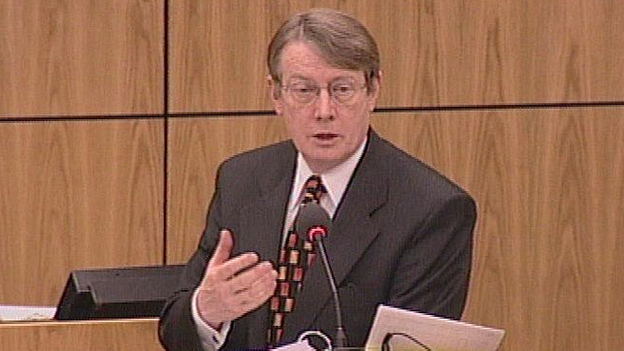Labour's rule changes: what do they mean in Wales?
- Published
- comments

Back to the future: Former First Secretary Alun Michael was one of the first to call for Welsh Labour to be represented on the party's NEC.
As a political anorak, I yield to few in my fascination with the internal rulebook of political parties. I recently spent an enjoyable summer's afternoon ploughing through the constitution of the Welsh Liberal Democrats.
It is easy to dismiss Tuesday's lengthy (8 hours, 24 minutes) meeting of Labour's national executive committee as a festival of navel-gazing, but there is a lot more at stake.
The idea that Wales should have its own seat on the NEC has been around for some time. Alun Michael used it as part of his Welsh Labour leadership campaign in 1998.
It will now happen, but only after a close vote and a long debate over how the Welsh representative should be chosen. He or she will now be a "frontbench" member of the Welsh Assembly, chosen by the party leader in Wales. (Carwyn Jones can currently attend NEC meetings but has no voting rights).
'Close vote'
The vote was close - 16 to 15 - because supporters of Jeremy Corbyn thought it better that the Welsh rep be chosen by rank-and-file members who might be more in tune with his philosophy than someone chosen by the Welsh party leadership.
NEC member Darren Williams told the BBC: "I voted against it in the way it was proposed. As far as Wales is concerned, it is completely unworkable. The idea a frontbench Assembly Member - or any Assembly Member - will be able to go to an NEC meeting in London on a Tuesday when the Assembly is sitting, and we only have 29 of 60 AMs is clearly not workable. I am in favour of the principle, but I think those positions should be elected by ordinary members."
Welsh Labour will also now take responsibility for its own elections, so the electoral college is likely to survive. One member one vote, with supporters able to pay to take part, is widely seen as key to the election of Jeremy Corbyn and few in the Welsh Labour hierarchy want to repeat the experiment when Carwyn Jones moves on.
The leader of Welsh Labour will also get the right to attend "Clause V" meetings, where the Labour general election manifesto is signed off. And the Welsh executive will "administer the procedure and selection of Westminster parliamentary candidates in Wales".
It's not clear whether that includes by-elections, where candidates have often been shortlisted by the NEC. But it could be significant with proposed boundary changes likely to mean some sitting Labour MPs going head-to-head for their own job.
'Federal'
Some MPs fear that Corbyn supporters will try to deselect them before the next election in what they would describe as a purge and others see as wider democracy in constituencies with growing memberships under the current leader. Again, it's unclear whether devolving powers to Cardiff would have any impact.
The changes add up to a more federal structure within Labour and "parity" with Scottish Labour, although its leader, Kezia Dugdale, says it will now have the power to make policy in reserved (i.e. not devolved) areas too.
In other news, the polls have closed in the Labour leadership election, with Owen Smith doing little to fuel optimism among his supporters that he might win: "I won't be serving in Jeremy's cabinet but I will do what I've always done which is be Labour, vote Labour loyally serve this party, make sure that from back benches I continue to make the arguments I've made during this campaign."
The election result will be declared on Saturday ahead of the Labour conference in Liverpool, where the changes to Labour's internal machinery are expected to be approved by delegates.